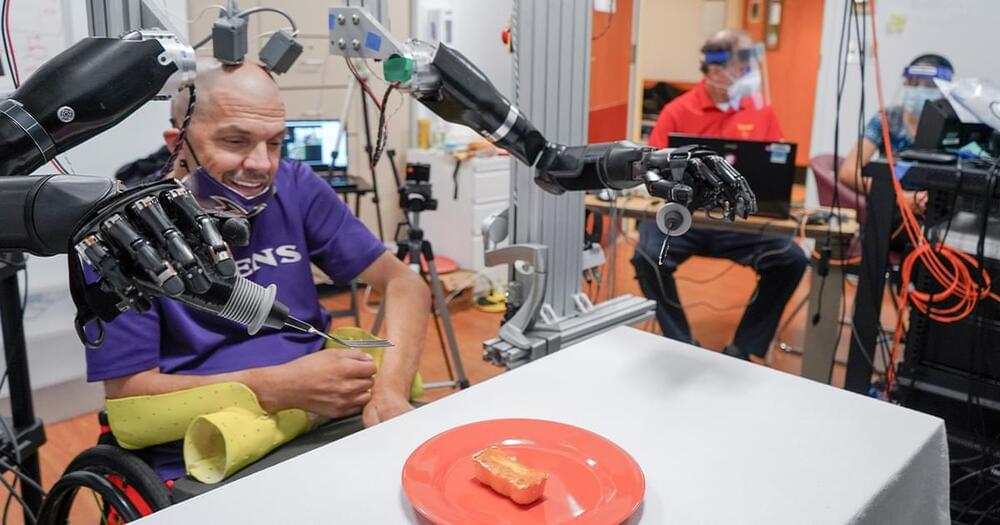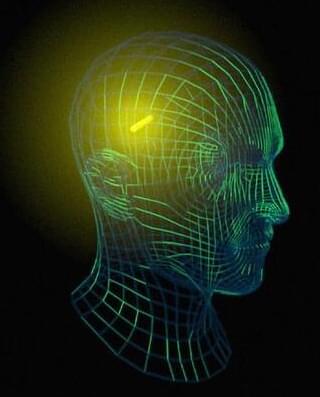Seen from the Himawari-8 geostationary satellite.



“Don’t look up” — where Earth is threatened by a “planet killer” asteroid.
This movie hits its target.
In the recent Netflix film “Don’t Look Up”, the Earth is threatened by a “planet killer” asteroid. Here’s how Earth would probably resond to these threats in reality.

A group of scientists at the U.S. Department of Energy’s Ames Laboratory has developed computational quantum algorithms that are capable of efficient and highly accurate simulations of static and dynamic properties of quantum systems. The algorithms are valuable tools to gain greater insight into the physics and chemistry of complex materials, and they are specifically designed to work on existing and near-future quantum computers.
Scientist Yong-Xin Yao and his research partners at Ames Lab use the power of advanced computers to speed discovery in condensed matter physics, modeling incredibly complex quantum mechanics and how they change over ultra-fast timescales. Current high performance computers can model the properties of very simple, small quantum systems, but larger or more complex systems rapidly expand the number of calculations a computer must perform to arrive at an accurate model, slowing the pace not only of computation, but also discovery.
“This is a real challenge given the current early-stage of existing quantum computing capabilities,” said Yao, “but it is also a very promising opportunity, since these calculations overwhelm classical computer systems, or take far too long to provide timely answers.”

There are widely cited forecasts that project accelerating information and communications technology (ICT) energy consumption increases through the 2020’s with a 2018 Nature article estimating that if current trends continue, this will consume more than 20% of electricity demand by 2030. At several industry events I have heard talks that say one of the important limits of data center performance will be the amount of energy consumed. NVIDIA’s latest GPU solutions use 400+W processors and this energy consumption could more than double in future AI processor chips. Solutions that can accelerate important compute functions while consuming less energy will be important to provide more sustainable and economical data centers.
Lightmatter’s Envise chip (shown below) is a general-purpose machine learning accelerator that combines photonics (PIC) and CMOS transistor-based devices (ASIC) into a single compact module. The device uses silicon photonics for high performance AI inference tasks and consumes much less energy than CMOS only solutions and thus helping to reduce the projected power load from data centers.
Full Story:
Lightmatter has a roadmap for even faster processing using more colors for parallel processing channels with each color acting as a separate virtual computer.
Nick said that in addition to data center applications for Envise he could see the technology being used to enable autonomous electric vehicles that require high performance AI but are constrained by battery power, making it easier to provide compelling range per vehicle charge. In addition to the Envise module, Lightmatter also offers optical interconnect technology that it calls Passage.
Lightmatter is making optical AI processors that can provide fast results with less power consumption than conventional CMOS products. Their compute module combines CMOS logic and memory with optical analog processing units useful for AI inference, 0, natural language processing, financial modelling and ray tracing.

Using a brain computer interface, the man cut and ate food with thought-controlled robotic hands. A man paralyzed from the neck down has used two robot arms to cut food and serve himself — a big step in the field of mind-controlled prosthetics.
Robert “Buz” Chmielewski, age 49, has barely been able to move his arms since a surfing accident paralyzed him as a teenager. But in January of 2019, he got renewed hope, when doctors implanted two sets of electrodes in his brain, one in each hemisphere.
The goal was that this brain computer interface would help Chmielewski regain some sensation in his hands, enable him to mentally control two prosthetic arms, and even feel what he is touching. man paralyzed from the neck down has used two robot arms to cut food and serve himself — a big step in the field of mind-controlled prosthetics.

Scientists have been trying to find ways to predict an epileptic seizure for decades, with little success. They are almost always unpredictable. The best techniques we have now — machine learning and self-awareness — give us only minutes notice ahead of the seizure.
Now, for the first time, a study has shown that brain activity could be used to forecast the onset of epileptic seizures several days in advance.
A New Hope
A team of researchers looked into data from brain implants designed to monitor and prevent seizures. Buried in the data, they found patterns of brain activity that predicted seizure risk a day or more in advance. The researchers say this could be used to create an epileptic seizure forecasting tool — giving new hope to patients with epilepsy.

Here’s how often it goes off.
Just like you, our planet has a ticker that keeps time: Earth’s geological “heartbeat” goes off on a regular schedule, albeit with millions of years in between, says a new study in Geoscience Frontiers.
When scientists from New York University and the Carnegie Institution of Science in Washington D.C. analyzed 260 million years of geological feedback, they found “global geologic events are generally correlated,” and seemingly come in pulses every 27.5 million years.
Those events include everything from “times of marine and non-marine extinctions, major ocean-anoxic events, continental flood-basalt eruptions, sea-level fluctuations, global pulses of intraplate magmatism, and times of changes in seafloor-spreading rates and plate reorganizations,” the authors write. They considered a total of 89 such major events from the last 260 million years, from which the 27.5 million-year cycle emerged.
Elon Musk—via Starlink, a division of SpaceX—is in talks with “several” airlines to provide in-flight WiFi for passengers. His plan is to use Starlink’s ever-growing megaconstellation of satellites to equip customers with better WiFi while they fly the friendly skies.
Jonathan Hofeller, SpaceX’s vice president of Starlink and commercial sales, gave out details on the ambitious plan during a panel at the Connected Aviation Intelligence Summit on Wednesday.
With the help of robotics specialists, we can separate the truth from the hype.
Elon Musk has announced his plans for a new Tesla humanoid robot that will excel at “mundane tasks,” but he’s making some common robotics mistakes with his grand plans.
What does the future of a Tesla robot look like? With the help of a couple of robotics specialists, we can separate the truth from the hype in Musk’s claims.
What can we expect from a true humanoid robot?
Making a robot look and even behave like human figure brings many programming challenges. Will the Tesla bot do bipedal locomotion, the complex two-legged walking that humans have perfected over millions of years? (Or dance like the very obvious human in a Tesla Robot suit did at Tesla AI Day when Musk made the announcement?) Northwestern University robotics professor Michael Peshkin said it’s tasks like this that are often underestimated by the public.
“A baby spends several years learning how to move their body around,” Peshkin said. “We never appreciate how sophisticated people are to begin with. It’s the things that babies can do that are so hard for robots.”